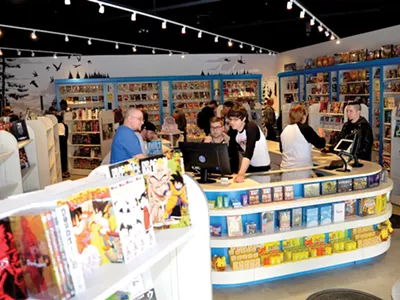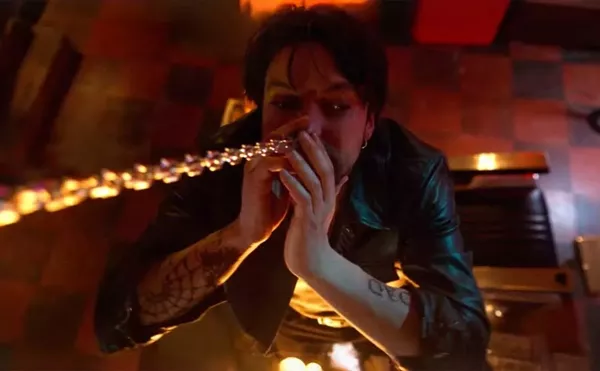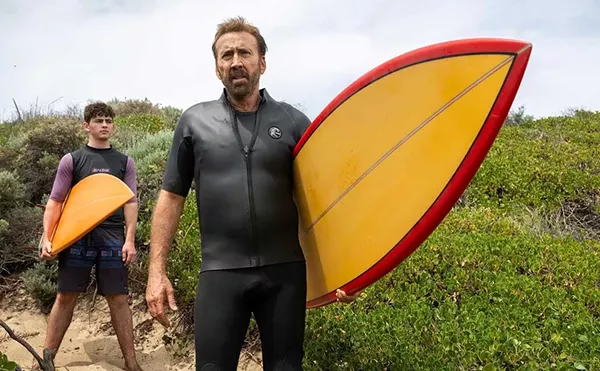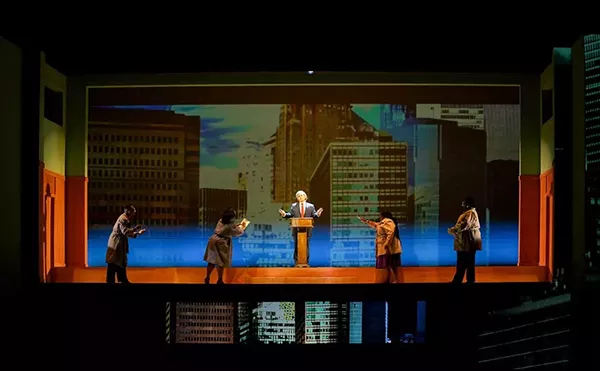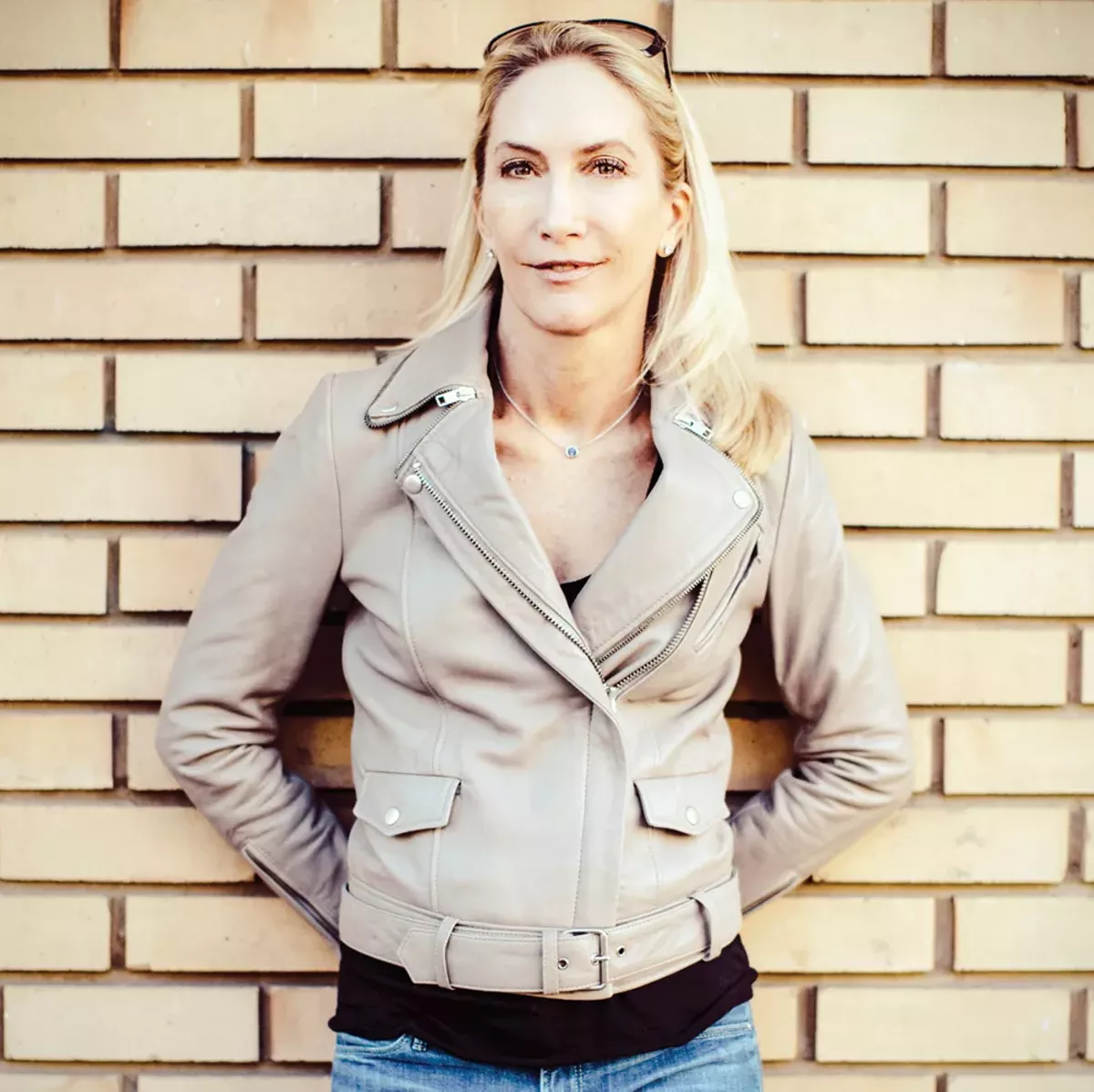

Audio By Carbonatix
[
{
"name": "GPT - Leaderboard - Inline - Content",
"component": "35519556",
"insertPoint": "5th",
"startingPoint": "3",
"requiredCountToDisplay": "3",
"maxInsertions": 100,
"adList": [
{
"adPreset": "LeaderboardInline"
}
]
}
]
***
Detroit, 1984. The potholes on Jefferson Avenue got worse every year. Five months of ice and snow and then the blasting April heat caused the pavement to buckle, then shatter. This, combined with the badly depleted coffers of local government, meant we had a piece of Swiss cheese for a road as we headed into the heart of Detroit to the abandoned Uniroyal Tire plant, an icon of the city's manufacturing past that was set to be demolished in just a few months.
We had been planning the excursion for weeks, speaking in muted voices in the hallways at school, lining up a car, discussing the pros and cons of various drugs. LSD, we'd finally agreed on.
Hobey drove while I sat in the passenger seat and Caitlin and Mike lounged in the back. Dilapidated buildings lined the street, and ambling jaywalkers crossed in front of our car. Hobey knew we were coming on, and he cranked up Bad Brains —hardcore raspy punk that made my skull ache. Grosse Pointe seemed a million miles behind us.
I observed Hobey's herringbone tweed overcoat, his trim buzz cut, his wicked smile — all so out of sync. Bags of provisions and gear were piled at my feet: cigarettes, beer, water, camera equipment. We passed a billboard displaying the tagline "Stroh's Is Spoken Here," and I felt a little ashamed. Stroh's was Detroit's beer, like Bud was for St. Louis, but it wasn't as if I'd done anything to deserve having my name up there like that. No one else noticed, or they didn't report on it if they did. My friends and I never talked about it, the wealth I'd grown up with.
Everyone in the car jammed to the music and smoked. We had Mickey's with us, not Stroh's. I opened one to calm my amped nerves. I was coming on fast to the acid. Outside the window, the streets visibly vibrated with the music while the car floated forward, a bubble of self-sufficiency, into the density of the forsaken city.
Toyota and Honda were winning the war. And Detroit, Detroit was an aftermath in the form of a city, a tragic defeat of all things American. Populations, industries, architecture — collapsing in on themselves like decimated ruins. The wreckage of this city etched itself into my genetic code. I could feel it, the patterns engulfing every shape and color.
I turned to Caitlin and Mike in the back seat. They smiled, their eyes melting pools of light. Caitlin's black hair blew sideways across her face. She had a fragile beauty, with the translucent skin, the shadow-encircled eyes, of a druggie. Mike wore his sheepskin vest, a silver medallion resting against his hairless chest. He put his hand on Caitlin's, holding on while his feet lifted off the floor, his red curls all liquid fire as he threw his head back, laughing at nothing at all, or maybe everything.
"Wow ..." It was all I could think to say. On the street a homeless man shared his food with a dog. "Wow, I mean, look ..." I trailed off, the waves of feeling so intense I knew they must have seen it too — the open wound that was the world.
Hobey switched the cassette and turned up the volume on "Box of Rain," smiling over at me. Deejay as shaman. The gentle, twanging notes made the sun feel warmer, the sky bluer, the bombed-out city a kind of refuge.
Caitlin knew the way into the abandoned plant. An alley off the street led to an open side door that had been used by squatters. Old soiled clothes littered the filthy floor, along with broken glass, blankets, syringes. Entire walls had been painted black, as if to simulate night.
We walked in astonished silence toward a great wall of windows, the sun pouring through, a waterfall of light. Outside, the vastness of the defunct tire plant stretched before us like a forgotten city: a maze of streets lined with two-story buildings, railroad tracks, even a garbage dump where torched tires melted under the sun. Yellow-and-black signs reading "Hazardous waste" had been posted on the sides of buildings. Concrete rubble piled up everywhere, as if an earthquake had toppled whole structures, forcing the city's inhabitants to flee.
We carried our cameras outside, into the maze. Caitlin and Mike held hands as we ducked under a barbed wire fence and walked along the train tracks. We pushed open an unlatched door, and our footsteps echoed inside a warehouse stacked to the ceiling with shipping containers. Dust hung in the air, catching the gauzy light.
No one spoke. I snapped a shot with my Nikon. "Day turns to dust," I heard myself say, breaking the silence.
The warning signs had been posted everywhere. Uniroyal was a forbidden zone, the site a toxic waste-dumping site long before the hazards were even well understood.
We walked deeper into the maze of buildings, taking more pictures. Pools of putrid water had formed from all the spring rains, some of them full of trash and weeds. We wove around them, separating and coming back together, laughing out loud when one of us splashed through recklessly. Mike splattered mud on Hobey's coat, and Hobey kicked a black leather boot into the water, soaking Mike.
"You asshole!" Mike shouted. He brushed the grime from his vest and arms. When the water had settled, a solid organic object — something dead — floated at his feet.
Hobey stopped laughing. "What the fuck."
Caitlin walked closer and poked it with a stick, turning it over. "It's a rat." Her voice sounded hollow. She held up her camera and snapped the shutter.
"Jesus Christ," said Mike, stepping out of the water.
I bent over to see it closer. The eyes were open and black, the body the size of a small cat. The fur rippled rhythmically, and I wondered if it might still be alive, but Caitlin's sweater was rippling too. Everything with texture was alive.
I imagined thousands of rats all around us, rambling through sewer pipes or thrashing their tails inside little holes in the ground. I'd read a book once about the apocalypse that said only rats and cockroaches would survive a nuclear winter. They'd proliferate and take over the earth for millions of years until new species evolved. Even now, I thought I could feel things crawling on me. I scratched my arms up and down until I'd begun to produce welts.
A door slammed from somewhere inside the plant, and the sound ricocheted off the buildings in the silence. We all looked at one another. Had it been the wind? Anything could happen in here, and no one outside would know. People were murdered in Detroit every day.
I looked behind us and realized I wasn't sure how to navigate back out. "This is too weird," I said.
We lit cigarettes and listened to each other's labored breathing. Mike's curls looked artificially red under the now poisonous sun. He scanned the outbuildings of the walled city. "We should go," he said, his voice shaky.
Hobey put his hand on Mike's shoulder. "Relax, man. You're just having a bad trip, huh?"
But I'd had enough too. "Let's go back," I said. "We get caught in here, and we're screwed."
"No shit," said Caitlin, her pupils spheres of black velvet. She replaced the lens cap with a slender, jittery hand.
The magic had worn off, except for the bad kind. I thought I could feel the cockroaches under my clothes, could taste the radioactive particles on my tongue, like dirty pennies. And I suspected we weren't alone in the plant.
We took off, sprinting across the railroad yard, but I stopped suddenly and turned around, taking a last look. The web of discarded streets and buildings went on forever. The rest of Detroit wasn't far from being like this — every windowpane shattered, every door hanging from its rusted hinges. Life had left this place. I felt my legs running toward the distant sound of feet hitting ground. I went around some warehouses and ducked under the barbed wire fence where I knew my friends had been, their dust still suspended in the air. I saw them waiting for me in front of the main building. We threw open the door and raced through to the street.
We stood panting next to the car.
"Let's have a beer," Hobey said.
My father was cutting the lawn when I arrived home, and both my parents' cars were parked in the driveway. I could see the flashing screen of the TV through the library window. Being around my parents while on acid was an experience I generally tried to avoid, but everyone had bailed early, saying they needed to get home for dinner. Only then had I even remembered it was Tuesday. We had skipped school.
I entered the house through the side door, went up the back stairs, and slipped into my brother's bathroom, where I knew no one would find me. The mirror caught my reflection; my eyes were all pupils, lashes grotesquely long. My skin looked orangey red. My geometrical bob was knotted from the wind, except where the hairspray had secured it. Hobey called that sprayed bob my Darth Vader helmet. I laughed out loud at the absurdity of this.
My skin was moving, pulsing uncontrollably, like the walls, the tiled floor, the grain of the beige carpet in the hallway. Atoms, constantly moving.
I sat on the toilet to steady myself, the wall cool against my neck as I leaned back. The smell of freshly cut grass floated up from the garden through the open window, the sound of the mower as familiar as my mother's voice. I was home, safe in Grosse Pointe, the wasteland of Detroit some infinite distance away. Our neighbors, the Fruehaufs, were readying their pool for the summer, while the high school tennis team at Liggett was vigorously hitting balls, their courts just on the other side of the fence from us.
I knew I would go downstairs soon. I would act normal, as if I'd been at Hobey's house since school had gotten out, listening to his band practice in the basement. I would plant myself in front of the TV, find a movie on HBO, and wait for my mother to announce that dinner was ready.
But then I heard another familiar sound: my father's voice. He was shouting over the lawnmower, probably at Whitney. Tuesday, I reminded myself again. My father would have been "at work," meaning he'd been drinking all afternoon downtown near his office, putting me in grave danger of having a bad trip if I saw him.
I went down the back stairs and out of the house, and climbed into the front seat of the Ford station wagon. As I turned the key in the ignition, I could still hear my father's infuriated voice coming from the flagstone path that led to the terrace and lawn.
Out on the road I picked up speed. To the right was the country club golf course, a blinding streak of neon green. On the left were storybook estates — replicas of English manor houses, their sweeping lawns studded by towering trees. Twice as tall as the houses, their branches swayed like dancers' arms to an internal rhythm I couldn't hear, beckoning me. It was the waning acid talking, I knew, because the houses had invisible force fields keeping me at bay. In all their perfection, the homes looked as lifeless as the Uniroyal outbuildings, only the gardeners visible, in glimpses, to let you know any of it was even remotely real. Our house, a big brick Colonial we'd moved into when I was 9, was matchbox in comparison, if a good deal more inviting.
I passed the Williamses' house with the antique-car collection in their 12-car garage and, with my one-handed steering wheel grip, stubbing out my cigarette in the ashtray, took the curve past Buhl Ford's house. It seemed every house on Provencal Road had a family just like mine: at least one fanatical, uptight parent, with a host of wayward, rebellious youth. Often enough one of these kids wrapped a sports car around a tree on the golf course, the tire marks on the putting green a haunting reminder in the weeks that followed.
All the kids on the street, except me, either went to Liggett — the private school right by our house, where I'd gone for grade school and junior high — or to boarding school. And since Liggett hadn't taken me back after I'd been expelled from Taft, I'd matriculated at Grosse Pointe South High School the previous summer.
"Public school," my mother had lamented, "Oh, Frances ... that really is an embarrassment." I reminded her that Bobby and Charlie had also served time at South High after their boarding school expulsions. So I was in good company.
As I approached my cousins' house I could see both Uncle Peter's and Aunt Nicole's cars parked in the driveway, along with that of Gwendalyn, their Jamaican cook who had often made me cinnamon toast when I was a child. I'd be propped up on a stool as she chattered about her life in Jamaica in her intriguing accent, a whole wall of refrigerators humming behind me.
Nearly every house on the street had a fleet of cars — an American car to drive downtown to work, a pair of foreign cars in the garage for the weekends, the wife's car, the nanny's car, the cook's car, and the gardener's truck. It seemed one simply could not have too many cars.
I looked across the golf course at the uneven line where the horizon met the sky. Objects were once again becoming themselves as the acid wore off, contained inside predictable borders, the colors of things once again muted. The leaves on the trees had stopped glistening like wet diamonds. Grass was grass; golf carts were golf carts.
I passed Henry Ford II's neo-Georgian estate where the Hugo Higbies had lived before him. Then I drove out of the gated entrance to our cul-de-sac, the armed guard waving me through from his mini brick fortress, and down one block to Lakeshore Drive.
I turned left, having no idea where I was headed. All I wanted was to drive along the expanse of the blue lake, listen to Fleetwood Mac, and smoke.
Peppering Lakeshore Drive — once the jewel of Grosse Pointe, with its sprawling lakefront estates built as summer houses in the first quarter of the century with automotive money — were scores of Mafia palaces. Most of the grand, old houses had been leveled, the properties subdivided. Few could afford the staff to run them. New houses had gone up on smaller lots. I studied their red tile roofs, stucco walls, and flags of Italy flapping at full mast in the brisk wind off the lake. Mafia and automotive money now shared property lines, and everyone had bumper stickers pleading "Buy American."
The sun dipped low, setting the lake on fire, while above it a sky of blue glass began to crack with stars. I knew I should be home studying for my algebra test the next morning. But I'd had to get away from the sound of my father's voice.
I turned the car around by the yacht club and started heading back. The lights of Windsor were just coming on across the lake: Canada — our unlikely neighbor. My father had once taken me to Niagara Falls. We'd spent the afternoons in the wax museums looking at life-size wax replicas of famous actors, then on barstools in the saloons where I'd sipped Shirley Temples and feasted on salty peanuts while my father had cocktails.
Now my father's favorite bar was Gallagher's. Ever since Stroh's had expanded nationally by acquiring Schlitz and Schaefer, he'd begun to feel peripheral at work. I sometimes wondered if he'd been replaced without actually being fired. I knew he'd had no involvement in the new popular "Alex the dog" ad campaign starring a golden retriever that fetched a can of Stroh's beer from the fridge for his owner, then drank it himself.
Then, when my father's brother Gari was suddenly paralyzed by a riding accident, leaving him in a wheelchair with only slight movement of his neck, like Christopher Reeve, my father had declined even further. The two brothers had never seemed close, getting together only once or twice a year, but the accident had come as a huge blow to the entire family. Now I understood that my father felt things, deeper down, that he didn't let on about.
Each day at noon my father left his office to have lunch at Gallagher's and then camped out at the bar for the balance of the day. He came home in the evening as if he'd just left from work, wintergreen mints floating on his breath barely masking the scent of the booze.
Whitney and I usually stayed upstairs in our rooms during this witching hour and focused on our homework. Or at least pretended to. My father always entered through the side door, his footsteps falling heavily on the linoleum in the back hall, making my spine stiffen as I sat at my desk. Once he'd come into my room while I was writing a paper and had slapped me across the face, for no apparent reason. Later, he'd come back in, crying and apologizing. He was just drunk, he said.
The last of the evening light across the lake dissolved into black. There was nowhere else to go except home, though I wished I could just drive until I found the sun again, over the horizon beyond everything known or visible. I'd drive through wheat fields and cities and suburbs where other kids dreamed of leaving, and from there I'd keep going, never stopping until I came to that spot of sun I could sometimes see from this distance, or at least imagine was there.
The dinner dishes had already been stacked in the sink when I came into the kitchen. My uneaten portion remained in a pot on the stove — Chef Boyardee canned ravioli. Jell-O brand chocolate pudding cooled in glass cups on the countertop. A salad of iceberg lettuce wilting in a wooden bowl. It was the kind of food we ate when my mother hadn't found time to grocery shop.
I took a fork from the drawer and speared the ravioli into my mouth straight from the pot. The pasta shell was still warm but the meat filling was stiff with cold. Sometimes my mother didn't heat things all the way through.
I heard the clatter of my mother's loafer heels on the dining room's wooden floor.
"Where have you been, Frances?" she said as she came into the kitchen.
"Studying with Andrea," I said automatically, still chewing over the stove. Andrea was my chemistry study partner, and I happened to be getting an A in chemistry.
"Andrea's a nice girl," my mother conceded. She went over to the sink and began rinsing the dishes, then loading them into the dishwasher. She wore a wool tweed skirt and a T-shirt with the word "Bermuda" across the front in pink script. The freckles on her calves danced chaotically as she sponged off the dishes. I watched the brownish spots with detached interest, hoping I could sleep in the aftermath of the acid. I planned to wake up at 4:30 a.m. to study for my math test.
I opened the refrigerator and stood staring at its contents. A half-eaten honey-baked ham draped with foil, a macaroni-and-cheese casserole from the week before, three eggs.
My mother had either been at the real estate office (her new job), touring houses with clients, or playing backgammon. Both occupations had become her antidote to the bedlam at home while also helping to create it. And since she was the first woman in her family to work and to not have a cook, we were often left to forage.
"Is there anything else to eat?" I asked.
"I didn't have time to go to the store today," said my mother, switching on the disposal.
I was used to food being a last priority, but I was hungry. It had occurred to me more than once that if my father bought one fewer antique gun each year for his collection, we would surely be able to afford a cook, but the fact was, my parents didn't care much about good food. Perhaps in rebellion against their more formal upbringings, my father subsisted on Domino's pizza; my mother, on Campbell's soup and Saltines spread with Jif. My father hated sitting at the dining room table, and who could blame him? His mother had used the evening meal as an occasion to berate her husband and criticize her sons. As for my mother, she had been kept in the kitchen at mealtimes with the cook until she was 9 years old, while the rest of the family was served meals in the dining room.
"Can I order a pizza?" I asked my mother. I was staring at the missing child's photo on the milk carton in the refrigerator. She was blonde with home-cut bangs, maybe 6 years old. I wondered if they'd found her yet.
"I think Dad has some left over in the library," said my mother.
I was always hungry. By the time I was 10, I had learned how to make a good omelet, chocolate mousse, popovers, and pasta with bottled sauce. I missed the chickens Ollie would sometimes roast before she left to go home in the evening. But Ollie was gone now, back in Detroit and living on welfare, and with her had gone any sense of order.
"Ollie has to take care of her mother full-time now," my mother had told me.
I went into the library with a plate. My father sat in his leather chair, a remote in his hand, in his usual postwork outfit — khaki pants, dress shirt, and Topsiders with no socks. With his light blue eyes and cleft chin, he looked like some famous actor whose name you couldn't quite remember. A Domino's box sat open on the floor at his feet with a half-moon of pepperoni pizza.
"Hi, Franny," he said with an absent smile. "Been studying?"
"Of course," I answered. My grades were good so my parents never hassled me about my whereabouts. "Test tomorrow."
I placed a slice on my plate. My father was watching The Incredible Hulk. Ever since the show had premiered, my father had co-opted Bill Bixby's famous line, "Don't make me angry. You wouldn't like me when I'm angry," offering up this threat whenever Whitney or I started to annoy him.
My father's photographs, painstakingly shot and printed, sat in piles throughout the room, still in their envelopes. Occasionally one landed in a frame, either at our house or someone else's, and the rest would eventually go into boxes, and the boxes into the attic. My father's 80 or so cameras cluttered the clothes and linen closets.
The tragedy of my father's life was contained in those dust-covered boxes. We hardly spoke about it, except when my mother would say, "Dad is so talented. He really should do more with his photography."
I'd grown up under the weight of all those unseen photographs and unused cameras, its burden so pervasive that even the air in our house seemed to have texture and mass. I observed my father on weekends in endless rounds of cleaning cameras and restacking print piles, or looking in vain for some shot of me on the terrace made the previous summer, to no avail. The mess just grew bigger, engulfing the pantry, then the kitchen, then the library, as my father was defeated by his own inability to edit, file, and catalog.
Maybe the saddest story of my father's life was a missed meeting with his great idol, the renowned Life magazine photographer Alfred Eisenstaedt, who was scheduled to be on Martha's Vineyard in the summer of 1962, at the same time my parents planned to be there with Bobby and Charlie, just toddlers at the time. My father allegedly wrote Eisenstaedt a letter telling him he would like to meet. Taken with my father's enthusiasm for his work, Eisenstaedt responded that he'd meet my father at Gay Head beach; he named the date and time, but when the day came around, my father lost his nerve and stood his hero up.
The story was told and retold in our family, usually by my mother, and soon took on the proportions of a mythical lost chance, coming to symbolize the tragedy of my father's unfulfilled potential. I always imagined Eisenstaedt standing alone on the beach at dawn, a tangle of Leica cameras around his neck, searching the coast for my father's lone figure in the mist.
Now my father was reviving his lost dreams through me. "You're a better photographer than I am," he liked to tell me. He loaded me up with equipment and encouraged me to photograph professionally, as he wished he had done. Since I was good at shooting people, I thought I might be a fashion or editorial photographer. I read Rolling Stone and Interview, Vogue and Vanity Fair. I studied the images, practiced the different styles. I was always experimenting. I felt as if I were tipping the scales of my father's lost chances by living the life he should have lived.
But my father's enthusiasm and support were something on which I could rely only when his mood was right. Other times, the house shook with his fury, and I turned to my camera, heading into Detroit or setting up shoots at friends' houses. The world through the lens was reduced to a manageable rectangle, and no chaos could penetrate the solace of the darkroom. Watching the clock while my prints developed and fixed lent predictability to my life, and I could cut a mat with the exactness of a surgeon. At the same time, my images were unpredictable, even mystifying; I never saw in my film what I thought I had through the viewfinder. I saw something realer, truer, as if separating a piece of the world from itself could somehow make the whole thing better.

